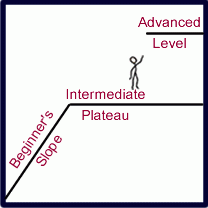Let’s start with why this happens…
There are actually two reasons we might hit a plateau.
The first is that the better you get at a language the harder it is to continue improving. Take this statistic for example:
Just 3,000 English words are needed to understand 95% of everyday texts. Whereas the average native speaker has the ability to use up to 20,000 words.
That’s a pretty big disparity. What this means is that knowing 3,000 words will put you in the intermediate range of language learning, but it takes a lot more effort and a lot more words to become an advanced speaker.
The second reason is that whether you’re learning a new language, practicing a sport, or learning how to type on a keyboard—it’s not only the amount of practice that you’re putting in, but the type of practice.
When we first start to learn a language we progress very quickly, from barely knowing how to introduce ourselves to making complicated sentences in the past and future tenses. We reach an autonomous stage.
The autonomous stage occurs when we no longer have to consciously think about what we’re doing. In language learning, this might be the stage when you can have a conversation without pausing to find the right word or the proper grammatical structure.
Reaching the autonomous stage, however, does not mean that you’re now an expert. In fact, this is the stage where it’s easy to see your language learning falter, because you’re no longer being challenged to learn more.
So what can we do…
Now that we know why we run into these plateaus, let’s look at some ways we can move past them.
The first way is to simply change the way you think about learning a language. It’s important to understand that improving as a new learner is very different from improving as an intermediate learner. There are always going to be diminishing returns as you get better at a language. This doesn’t mean you’re not progressing.
It’s easy to feel like you’re making progress when you master all the tenses of “to be,” but it’s important to keep in mind that learning less common vocabulary and more complex grammar is just as important to becoming fluent.
Best of all, once you have an intermediate or upper-intermediate language level, learning becomes a lot more fun. You can have real world conversations, watch movies and enjoy more engaging books.
The second way to improve is to focus on how you practice. Since it’s easy to become a passive learner at this stage, you have to force yourself out of your comfort zone. Try talking about topics you’re not 100% comfortable with, read texts that challenge you, look up words you don’t know even if they’re obscure, and talk to native speakers at a natural pace.
Just like when you were a beginner: Keep studying, keep pushing yourself, and if you haven’t already, find a teacher who can keep you accountable to your language learning goals!
How can I climb higher?
Here are my top tips for escaping from the intermediate plateau. They’re not rocket science, just basic advice gleaned from my teaching experience.
1) Don’t give up!
2) Keep expanding your vocabulary.
This means reading a lot and learning how words collocate (go together in semi-fixed expressions). Doing this also helps with your grammar.
3) Excavate your ‘fossilised errors’!
You know those little mistakes that you make over and over again? You probably have a collection of ‘You said… You should have said…’ error correction slips. Make sure you understand why your errors are wrong and make a concerted effort to change!
4) Immerse yourself in the language. Do something in English every day.
5) Pursue your interests in English! If you’re into philosophy read philosophical works in English. This will keep you motivated.
That’s all for now, I’d love to hear your tales of clambering off the intermediate plateau.
IT MIGHT BE INTERESTING TO READ CRISTINA´S POST…BY CLICKING ON HER PICTURE
 READING MY COLLEAGUE CRISTINA CABAL´S LATEST POST MADE ME THINK ABOUT MY OWN STUDENTS. MANY OF MY 1B2 STUDENTS THIS YEAR FEEL AS IF THEY´RE NOT MAKING ENOUGH PROGRESS, HAVING THE IMPRESSION THAT THEIR LANGUAGE LEARNING HAS SLOWED DOWN CONSIDERABLY OR JUST FEELING THEY ARE STUCK IN THE “INTERMEDIATE PLATEAU”…(SENSACIÓN DE ESTANCAMIENTO), BUT TO WHAT EXTENT IS THAT REAL?
READING MY COLLEAGUE CRISTINA CABAL´S LATEST POST MADE ME THINK ABOUT MY OWN STUDENTS. MANY OF MY 1B2 STUDENTS THIS YEAR FEEL AS IF THEY´RE NOT MAKING ENOUGH PROGRESS, HAVING THE IMPRESSION THAT THEIR LANGUAGE LEARNING HAS SLOWED DOWN CONSIDERABLY OR JUST FEELING THEY ARE STUCK IN THE “INTERMEDIATE PLATEAU”…(SENSACIÓN DE ESTANCAMIENTO), BUT TO WHAT EXTENT IS THAT REAL?
















Look over these helpful tips:
LikeLike
YEAH, You have to do things in a different way, but it might take students at least two years if they´re not living in a foreign country….. So, don´t give up.
LikeLike